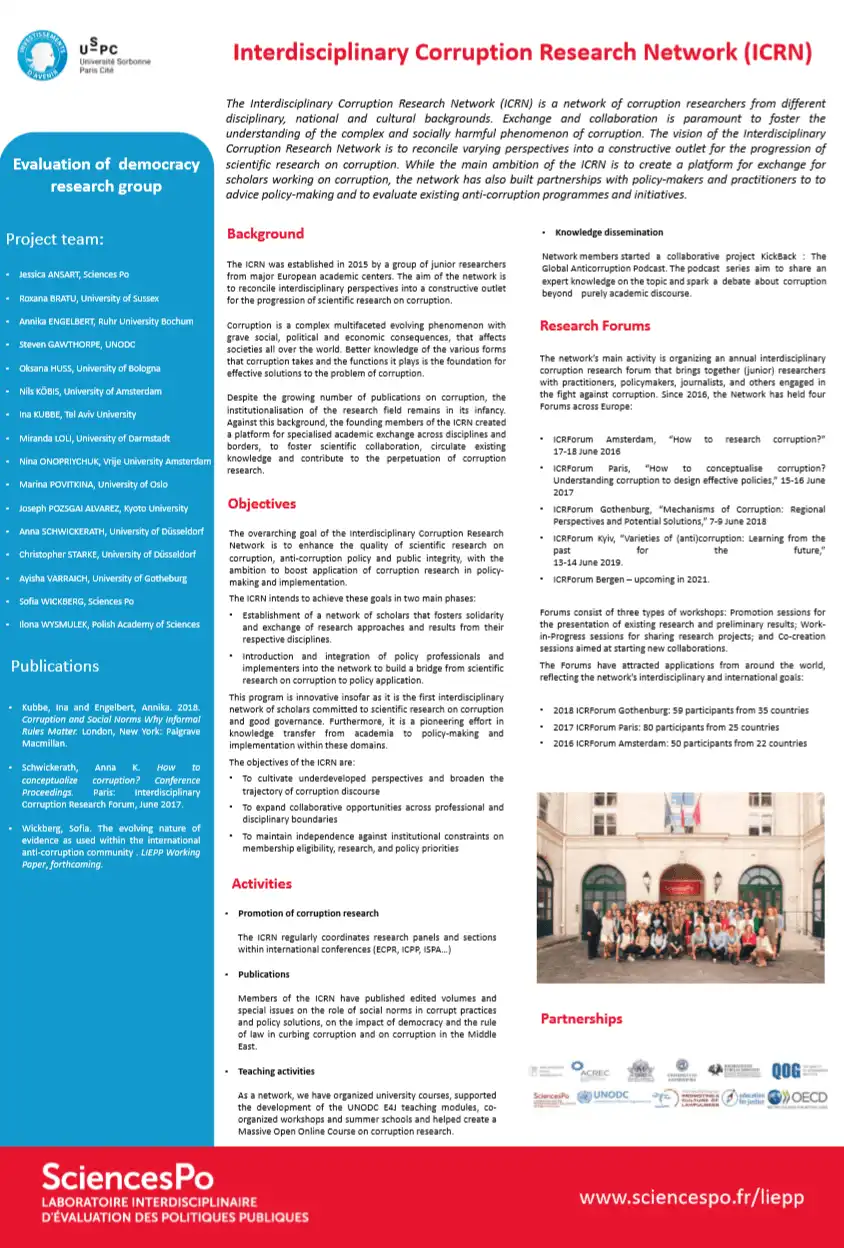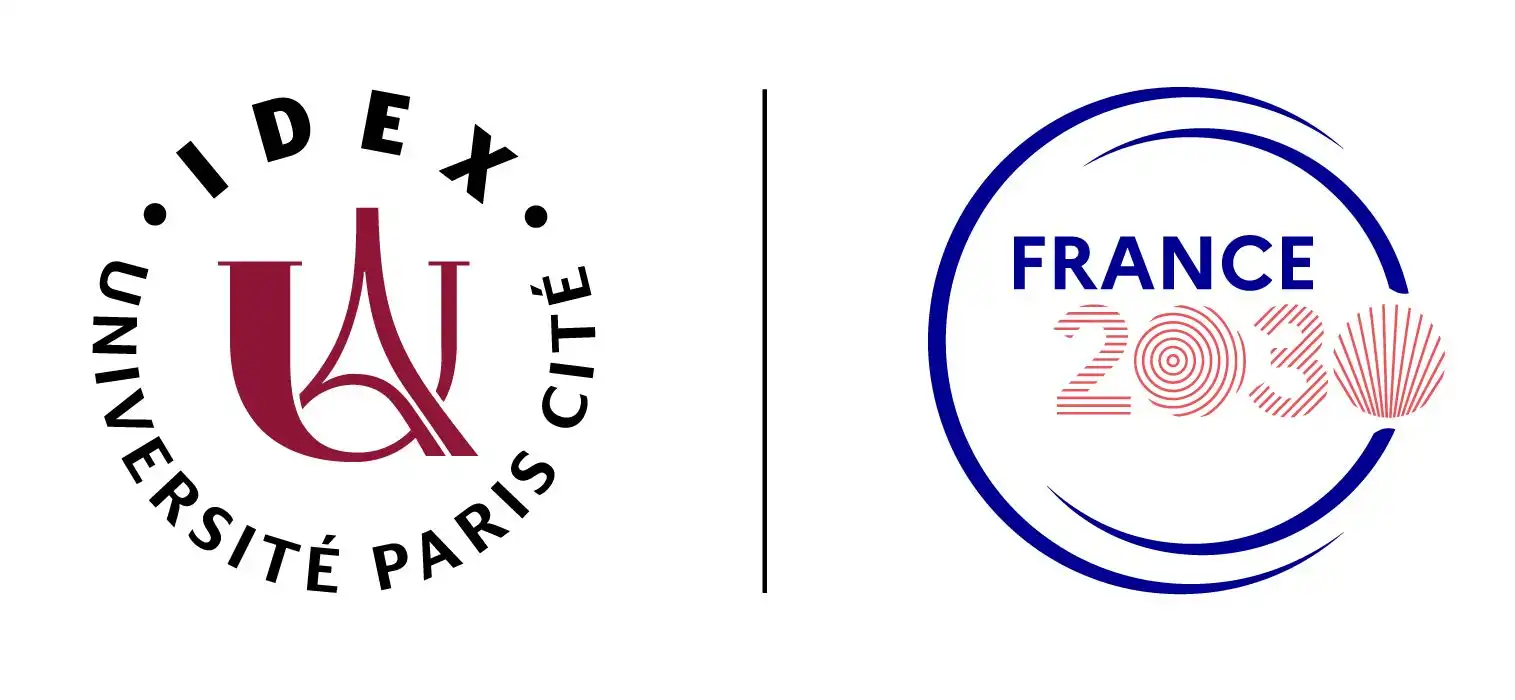
Home>Research>Project>Evaluating Anti-Corruption Policies
Evaluating Anti-Corruption Policies
Research team :
Emiliano GROSSMAN (associate professor Sciences Po CEE and LIEPP)
Quoc-Anh DO (associate professor department of economics Sciences Po and LIEPP)
Sofia WICKBERG (PhD student in Political Science, Sciences Po CEE)
The Interdisciplinary Corruption Research Network (ICR)
The Interdisciplinary Corruption Research Network (ICRN) is an international research network, aiming to analyse and explain the phenomenon of corruption with a multi-method approach. For this purpose we organize conferences, called Fora, to enable an active exchange between (young) researchers working on corruption.
2nd ICR Forum 2017 in Paris (15-17th June, 2017)
Faced with the increasing awareness of the failure of most anti-corruption policies, scholars and practitioners working on the topic ought to ask themselves what went wrong. The 2nd ICRF 2017 wants to contribute to this reflection by offering young scholars an opportunity to discuss problems with current anti-corruption policies and more specifically to examine the challenge with conceptualising corruption itself and identifying its root causes. The second ICR Forum, scheduled to take place in summer 2017 in Paris, will focus on the conceptualisation and theories of corruption as an essential – although often overlooked – phase of the policy cycle; a theme that was identified during the inaugural June 2016 Forum as an area of corruption research that requires more attention, energy and discussion. Evaluating anti-corruption policies through the prism of innovating conceptualisations of corruption should contribute to a better understanding of their efficacy – or lack thereof.
It is widely recognised, among scholars and practitioners, that corruption lacks conceptual precision. Pushing the discussion further and refining the conceptualisation of corruption, and its various forms, is important from the perspective of both academic researchers for whom concepts are the basic units for thought and analysis (Sartori, 2009), and practitioners who need definitions that are precise and operational. Indeed, many scholars have identified theoretical mischaracterization of the problem of corruption (Persson, Rothstein and Teorell, 2013) and the gap between design and reality (Heeks, 2011) as the main sources of policy failure.
The ICRForum 2017 will offer a space for new ideas on how corruption definitions change across time and space, on typologies of practices, on related concepts such as the public/private dichotomy or the notion of abuse. These discussions will contribute to reducing the “nagging sense of incompleteness” (Johnston, 2015) around our current understanding of corruption by combining theoretical and empirical efforts to conceptualise specific occurrences of corruption, such as systemic corruption or political corruption, and more empirical work aiming to identify the roots of the issue. Furthermore, with policy design in mind, we can employ this improved understanding of the problem to launch discussions on the important role that plays in reforming policies aimed at combating corruption.
The ICRForum will generate two or three thematic working papers linking innovative conceptualisations of the problem of corruption with their potential for policy design.
4th ICR Forum in Kiev (13-15th June, 2019)
The Fourth Interdisciplinary Corruption Research Forum, “Varieties of (anti)corruption: Learning from the past for the future” aims to bring together international junior researchers as well as practitioners working in the fields of corruption and anti-corruption. Interactive session will focus on different manifestations of corruption in respective contexts, and on the development of anti-corruption policies in a time of international and public pressure for reform. These discussions will combine theoretical and empirical reflections on the role of political culture, institutions, existing social movements, international organizations, the role of political and economic elites, technological development and media for the dynamics and politics of corruption and the conception(s) of the opposite to corruption.
Poster of the project - June 2020

For more information :
Reports ICR Forums 2015 - 2019

